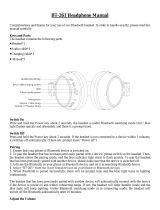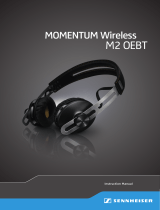
1
Important safety information
Contents
Important safety information ................................................................................................................................................ 1
Delivery includes ....................................................................................................................................................................... 3
Features of the MM 100 .......................................................................................................................................................... 3
Operating elements .................................................................................................................................................................. 4
Overview of pictograms .......................................................................................................................................................... 4
Overview of buttons ................................................................................................................................................................ 5
LED indications .......................................................................................................................................................................... 6
Putting the MM 100 into operation ...................................................................................................................................... 7
Charging the headset battery ........................................................................................................................................... 7
Switching the headset on .................................................................................................................................................. 8
Establishing Bluetooth connections ................................................................................................................................ 8
Switching the headset off ................................................................................................................................................. 9
Pairing the headset ............................................................................................................................................................. 9
Using the MM 100 ................................................................................................................................................................. 10
Wearing the headset ....................................................................................................................................................... 10
Listening to music ............................................................................................................................................................ 11
Calling ................................................................................................................................................................................. 11
Muting/unmuting the headset’s microphone ............................................................................................................ 13
Changing the volume ....................................................................................................................................................... 13
If you are out of the transmission range ..................................................................................................................... 13
Cleaning and maintaining the MM 100 ............................................................................................................................. 14
Accessories .............................................................................................................................................................................. 14
Specifications .......................................................................................................................................................................... 15
Manufacturer declarations .................................................................................................................................................. 16
Important safety information
The MM 100 has been manufactured according to the accepted rules of safety and current technology. However,
there is still a danger of damage to equipment if the following general safety instructions are not complied with.
• Read this instruction manual.
• Follow all instructions.
• Make this instruction manual easily accessible to all users at all times. Always include this instruction manual
when passing the MM 100 on to third parties.
General instructions
• Never disassemble or modify components of the MM 100.
• The built-in rechargeable battery may present a fire or chemical burn hazard if mistreated. Therefore, do not
disassemble, heat above 40 °C (104 °F) or incinerate the rechargeable battery.
• Sennheiser Communications is not liable for damages resulting from the loss of connection due to a run flat
battery, an old battery or exceeding the transmission range.
Before operation • Use the MM 100 in dry places only and keep liquids and small electrically conductive parts away from the
MM 100 and its connecting sockets.
• Do not expose the MM 100 to extreme temperatures. Normal operating temperatures are 10 °C (50 °F) to
40 °C (104 °F).
• Store the headset in a clean, dust-free environment.
During charging • Do not wear the headset when charging.
• Sennheiser Communications is not liable for damages to USB devices that are not consistent with the USB
specifications.





















